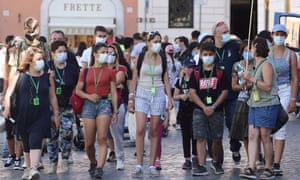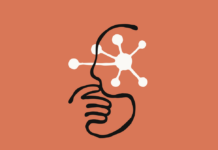Italy records biggest daily infection rise since May
Italy registered 947 new infections on Friday, the biggest daily Covid case rise since 14 May, when the country was still in lockdown.
The total number of cases is now up to 257,065. Nine more people have died with the virus and the death toll now stands at 35,427.
Last week the government obliged holidaymakers returning from Greece, Malta, Spain and Croatia to be tested for the virus. Rome said it was also considering adding France to the list.

“There is continued talk of a second wave of the virus, but in fact the first wave is actually not over yet,’’ the health ministry consultant Walter Ricciardi said on Friday. “We knew that easing [lockdown] measures would have consequences.’’
The number of new infections in recent days seems to be the price Italy is paying in order to put the economy back on track, especially in the tourism sector.
Back in May, as the country began to emerge from lockdown, authorities were obliged to strike a balance between the need to reopen public spaces and national borders, fundamental for economic recovery, and the obligation to safeguard public health. But what if Rome went too far?
Updated
Prolonged school closures in Africa could set back the life chances of a generation of children and deepen inequality, according to the World Health Organization. Hundreds of millions of children have been out of school across Africa for six months, following lockdown measures adopted across the continent.
A WHO survey of 39 countries in sub-Saharan Africa found that just six countries have fully reopened schools, which remain completely closed in 14 countries. A further 19 countries’ schools are partially reopen for exams.
“We are very keen for schools to reopen as soon as possible,” the director of the WHO Africa region, Dr Matshidiso Moeti, told the Guardian. “This is an issue that could deepen the disparities that already exist. Education is vital; we must make sure that we contain Covid-19 but not damage the future of our countries,” she said.
Economic and gender inequalities, as well as those between rural and urban areas, were at risk of widening during the pandemic.
“I know how important educating kids from disadvantaged backgrounds is and how transformative it can be,” she said. “Especially for girls. I’m dead keen on them returning to school. We know how critical it is for their health and their survival.”
The WHO has urged governments to adapt lockdown measures from being state-wide to local where possible, and explore innovative solutions using technology. Countries should also consider outdoor education in some circumstances, Moeti said. “This is one of the few cases where you can possibly find it acceptable for kids to learn outside, which is not ideal at all, but in this case, kids learning out in the open air while we build up the public health capacities to be able to manage the situation is very important.”
Cases of the coronavirus have slowed in Africa over the last two weeks, falling by a quarter compared with the previous two weeks. More than 1.1m infections have been confirmed on the continent, with almost 900,000 recoveries, while almost 27,000 people have died.
Updated














